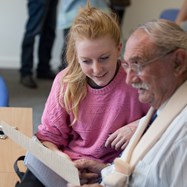Research spending and overseas aid: a case for the Global Challenges Research Fund
18 December 2020
The 2020 Spending Review laid bare the difficult choices facing the Government as it deals with the health and economic crises caused by the Covid-19 pandemic. The value of research and innovation in spurring economic growth was recognised by the Chancellor as one of the few areas to receive a multi-year settlement.
However, the Spending Review also included a temporary adjustment to the UK’s aid spending and we are concerned this could have a significant impact on the Global Challenges Research Fund, which delivers tangible technological, health, policy and social impacts, whilst underlining the UK’s position as a global actor and supporting important relationships around the world.
Effective aid spending where it counts
The Government has made clear the UK will always be open and outward-looking, leading in solving the world’s toughest problems. The Russell Group supports this alongside the ambition for the UK to be a Science Superpower and believes both can be greatly assisted through effective spending of Official Development Assistance (ODA).
We believe three of the benefits of joined-up ODA spending are:
- Drawing on and boosting UK expertise in science and developing new technologies to address global challenges and benefit the poorest people in the world
- Enhancing the UK’s reputation as a global leader, building its soft power, international links and realising the vision of Global Britain
- Supporting the development of researchers and R&D ecosystems through strengthened collaborations with the partner countries and emerging markets.
All of these are delivered through the Global Challenges Research Fund.
The Global Challenges Research Fund (GCRF)
The GCRF was launched in 2016 and has been a hugely successful programme. As well as addressing pressing challenges faced by developing countries, it has helped to bolster the UK’s place as a world leader in development and a science superpower. As we move towards post-pandemic recovery and look to post-Brexit opportunities, the GCRF showcases our ingenuity and openness to the wider world.
The programme has allowed Russell Group universities to work with partners across the world to focus their world-class knowledge and innovation capabilities on improving global health, pioneering new technologies and supporting other nations to tackle climate change, amongst other impacts.
Some of the projects the GCRF has supported include:
Imperial College London is leading a network of Russell Group universities, the NHS and partners in the US, Canada, South Africa, Zambia and Senegal to improve the use of vaccines in pregnancy and newborns. Bringing together expertise across immunology, vaccinology, social sciences, industry, and public health it aims to improve maternal and newborn health globally. The project will strengthen R&D capacity within the UK and developing nations, with implications for the implementation of vaccine programmes in high-, middle- and low-income countries
Researchers at Durham University are looking at ways to better harness the potential renewable energy sources that can be found in Africa – estimated at around 55% of the world's potential renewable energy sources. The project is looking at how to support the use of wind turbines in the different ground conditions found in Africa. The project will improve the competitiveness of UK companies in the African market of renewable energy and help train the next generation of African and UK geotechnical engineers.
The University of Leeds jointly leads GCRF-AFRICAP, a project helping food systems in Africa to become more productive, sustainable and resilient to climate change. GCRF-AFRICAP is creating an evidence base to support agricultural policy in Malawi, South Africa, Tanzania and Zambia further building the UK’s reputation in the continent.
Engineers at the University of Glasgow have developed effective, accurate and low-cost diagnosis tools for malaria and schistosomiasis for use in Sub-Saharan Africa. In addition to improving treatments for these two devastating diseases, the project - co-funded by the Department of Health with partners from British industry and charity - is providing new methods to engage with schoolchildren and the public about infectious disease.
The University of Cambridge is leading a project with partners in Kenya and Rwanda to tackle virus transmission in vital crops, enhancing food security in the region and globally.
What the Russell Group is asking for
To maximise the benefit of the UK’s ODA spend while also bolstering UK research and innovation, the Russell Group is asking Government to:
- Maintain current funding levels for the GCRF as a key plank of its ambitions for Global Britain and the UK as a Science Superpower
- Place our world-leading universities at the heart of the UK’s wider international strategy, including in future trade details, to help enhance Britain’s global impact and support international partnerships
- Utilise the opportunity of our new points-based immigration system to enhance student and researcher mobility from developing countries and emerging economies to enhance our international links and cooperation.
Download this briefing in PDF format:
Briefing note on GCRF (December 2020)
-
Hamir Patel
hamir.patel@russellgroup.ac.uk
020 3816 1316
-
Stephanie Smith
020 3816 1310
 X
X


